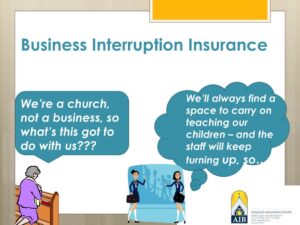Business interruption insurance is a type of insurance coverage designed to protect businesses from financial losses caused by disruptions to their normal operations. These disruptions could result from events such as natural disasters, fires, equipment breakdowns, or other unforeseen circumstances. Here are some methods to obtain business interruption insurance:
-
Through Commercial Insurance Providers: The most common method of obtaining business interruption insurance is through commercial insurance providers. Contact insurance companies that specialize in commercial insurance and inquire about business interruption coverage options.
-
Insurance Brokers or Agents: Work with insurance brokers or agents who specialize in commercial insurance. They can help assess your business’s needs, provide guidance on coverage options, and assist in obtaining quotes from multiple insurance companies.
-
Online Insurance Marketplaces: Use online insurance marketplaces to compare business interruption insurance policies from various providers. These platforms allow you to input your business information and receive quotes from multiple insurers, making it easier to find the right coverage.
-
Industry Associations or Trade Groups: Some industry associations or trade groups offer group insurance programs that include business interruption coverage as part of their benefits package. Check with associations or groups relevant to your industry to see if this option is available.
-
Professional Organizations: Professional organizations, such as chambers of commerce or business networking groups, may offer access to business interruption insurance programs for their members. Inquire with these organizations about available coverage options.
-
Business Consultants or Risk Management Advisors: Seek advice from business consultants or risk management advisors who specialize in helping businesses mitigate risks. They can provide guidance on the type and amount of coverage needed to protect your business from interruptions.
-
Financial Institutions: Some banks or credit unions may offer business interruption insurance as an add-on to other financial products, such as business loans or commercial property insurance. Inquire with your financial institution about available options.
-
Government Programs or Grants: In some regions, government-sponsored programs or grants may be available to help businesses recover from disruptions caused by certain events, such as natural disasters or public health emergencies. Research government resources or disaster recovery programs in your area for more information.
-
Legal and Accounting Professionals: Seek advice from legal or accounting professionals who may have knowledge of business interruption insurance options. They can provide guidance on the type of coverage you need and refer you to reputable insurance providers.
By exploring these methods, you can find business interruption insurance coverage that helps protect your business from financial losses resulting from unexpected disruptions, ensuring its continued operation and stability.Obtaining business interruption insurance involves several steps. Here’s a comprehensive guide to help you through the process:
1. Assess Your Needs
- Understand Your Risks: Identify potential events that could disrupt your business operations, such as natural disasters, equipment failure, or other unforeseen incidents.
- Evaluate Financial Impact: Estimate the financial losses that could result from a business interruption, including lost revenue, ongoing expenses, and additional costs incurred to resume operations.
2. Research Insurance Providers
- Compare Providers: Look for reputable insurance companies that offer business interruption insurance. Check their financial stability, customer reviews, and claims processing history.
- Get Recommendations: Seek recommendations from other business owners or industry associations.
3. Consult with an Insurance Broker
- Find a Specialist: Work with an insurance broker who specializes in commercial insurance. They can provide expert advice and help tailor a policy to fit your specific needs.
- Discuss Coverage Options: Discuss different coverage options, including what events are covered, the duration of coverage, and any exclusions or limitations.
4. Determine Coverage Amount
- Calculate Coverage Needs: Work with your broker to calculate the appropriate coverage amount. This should include projected revenue, ongoing expenses, and potential additional costs during a period of interruption.
- Review Financial Statements: Provide detailed financial statements and projections to ensure accurate coverage assessment.
5. Understand Policy Terms
- Review the Policy: Carefully review the terms and conditions of the policy, including coverage limits, exclusions, waiting periods, and claim procedures.
- Clarify Doubts: Ask your broker to explain any unclear terms or conditions to ensure you fully understand the policy.
6. Obtain Quotes
- Request Quotes: Obtain quotes from multiple insurance providers to compare costs and coverage options.
- Negotiate Terms: Negotiate with providers to get the best terms and pricing.
7. Purchase the Policy
- Select the Best Option: Choose the policy that offers the best coverage for your business needs at a reasonable cost.
- Complete the Application: Fill out the necessary application forms and provide any required documentation.
8. Regularly Review and Update the Policy
- Periodic Reviews: Regularly review your business interruption insurance policy to ensure it continues to meet your needs as your business grows or changes.
- Update Coverage: Adjust coverage amounts and terms as necessary to keep pace with changes in your business operations and potential risks.
Key Considerations
- Business Continuity Plan: Develop a business continuity plan to complement your insurance policy, detailing how your business will respond to and recover from an interruption.
- Documentation: Keep thorough documentation of your business operations, financial records, and inventory to support any future claims.
- Claims Process: Understand the claims process, including the documentation required and the timeframe for submitting a claim.
By following these steps, you can secure business interruption insurance that provides the financial protection your business needs in the event of an unforeseen disruption.


